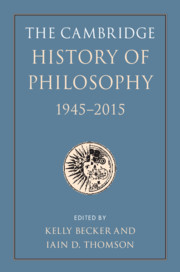Book contents
- The Cambridge History of Philosophy, 1945–2015
- The Cambridge History of Philosophy, 1945–2015
- Copyright page
- Contents
- Contributors
- Preface and Acknowledgments
- Introduction
- Part I Analytic Philosophy
- Part II Continental Philosophy
- Section Five Central Movements and Issues
- 26 Existentialism
- 27 Sartre and Merleau-Ponty on Freedom
- 28 Heidegger, Critical Theory, and the Critique of Technology
- 29 Authenticity and Social Critique
- 30 Hermeneutics in Post-War Continental European Philosophy
- 31 Feminist Philosophy since 1945
- 32 Philosophies of Difference
- Section Six Continental Moral, Social, and Political Philosophy
- Section Seven Continental Aesthetics and Philosophy of Religion
- Part III Bridge Builders, Border Crossers, Synthesizers, and Comparative Philosophy
- Part IV Epilogue: On the Philosophy of the History of Philosophy
- References
- Index
32 - Philosophies of Difference
from Section Five - Central Movements and Issues
Published online by Cambridge University Press: 08 November 2019
- The Cambridge History of Philosophy, 1945–2015
- The Cambridge History of Philosophy, 1945–2015
- Copyright page
- Contents
- Contributors
- Preface and Acknowledgments
- Introduction
- Part I Analytic Philosophy
- Part II Continental Philosophy
- Section Five Central Movements and Issues
- 26 Existentialism
- 27 Sartre and Merleau-Ponty on Freedom
- 28 Heidegger, Critical Theory, and the Critique of Technology
- 29 Authenticity and Social Critique
- 30 Hermeneutics in Post-War Continental European Philosophy
- 31 Feminist Philosophy since 1945
- 32 Philosophies of Difference
- Section Six Continental Moral, Social, and Political Philosophy
- Section Seven Continental Aesthetics and Philosophy of Religion
- Part III Bridge Builders, Border Crossers, Synthesizers, and Comparative Philosophy
- Part IV Epilogue: On the Philosophy of the History of Philosophy
- References
- Index
Summary
We might call the philosophical period in France ranging from the 1962 publication of Gilles Deleuze’s Nietzsche and Philosophy to Michel Foucault’s death in 1984 “the epoch of difference.” That period saw the publication of Deleuze’s 1968 Difference and Repetition, Jacques Derrida’s major 1967 and then 1972 works with the appearance of différance and related concepts, Emmanuel Levinas’s 1978 Otherwise than Being (Totality and Infinity was published in 1961, but its influence developed later), and Foucault’s work from the 1966 The Order of Things through the second and third volumes of his History of Sexuality. This period also saw related works by Jean-François Lyotard (1988 [1983]), Jean Baudrillard (1994 [1981]), and perhaps the most well known of Jean-Luc Nancy’s work, 1983’s The Inoperative Community. Although the treatments of difference in these works are extraordinarily diverse, it is remarkable how deeply the major thinkers (with the possible exception of Foucault, whose relation to difference is more indirect) are concerned with the idea of difference and its role in constructing a philosophical position. And although I have, a bit arbitrarily, marked 1984 as the end of this “epoch,” its influence continues well beyond that date.
- Type
- Chapter
- Information
- The Cambridge History of Philosophy, 1945–2015 , pp. 427 - 442Publisher: Cambridge University PressPrint publication year: 2019
- 1
- Cited by



